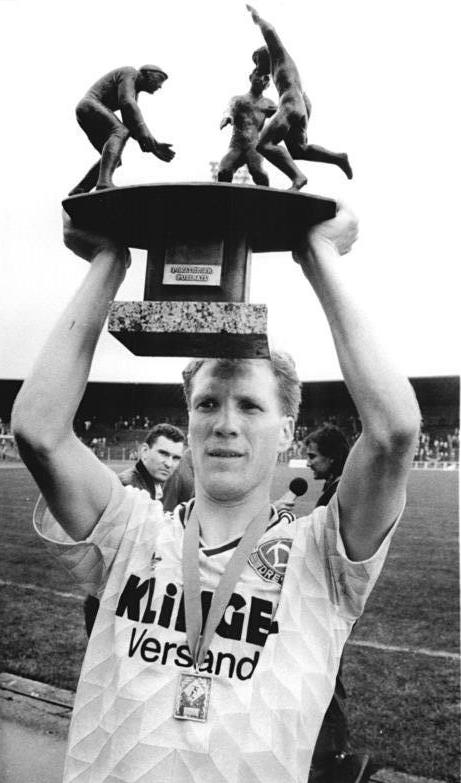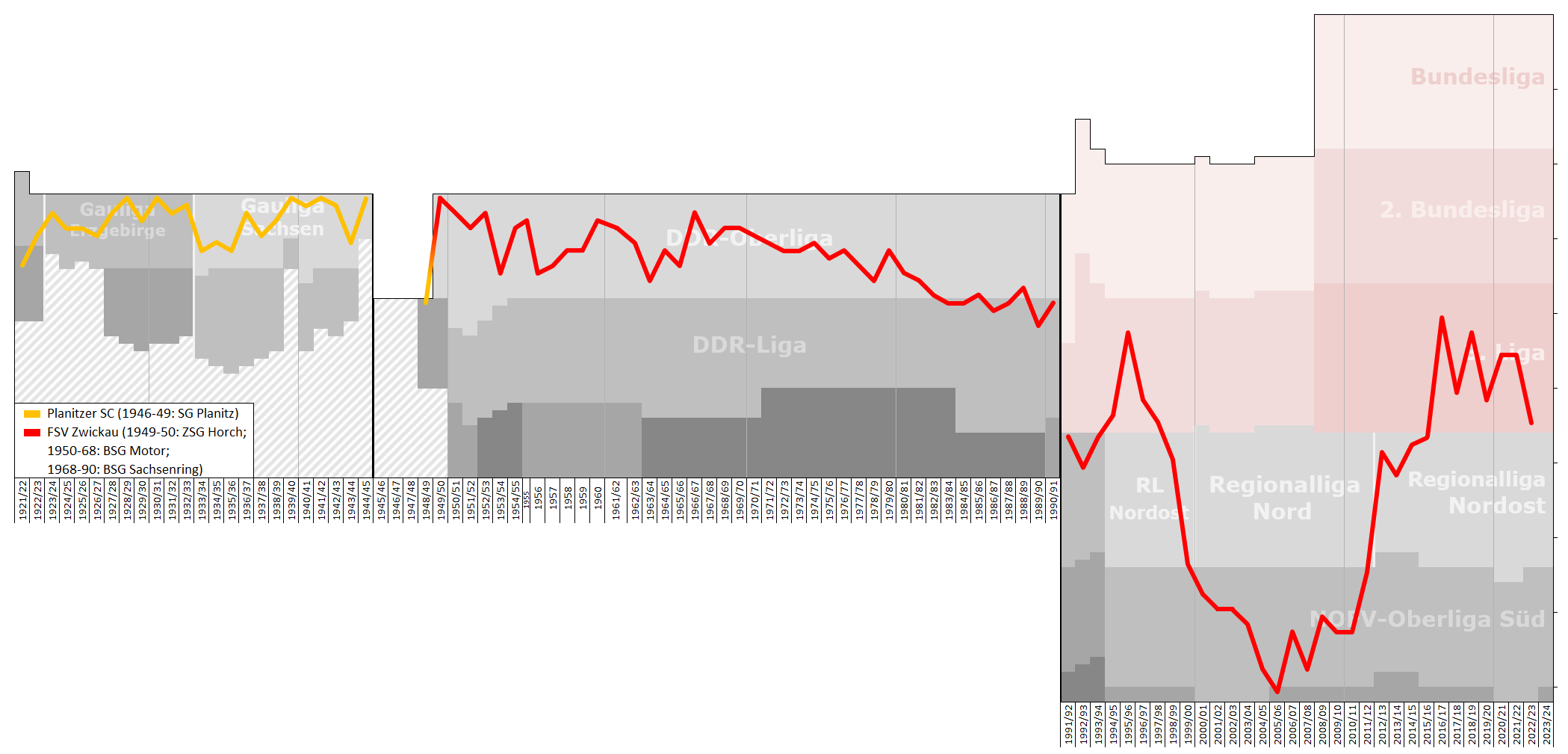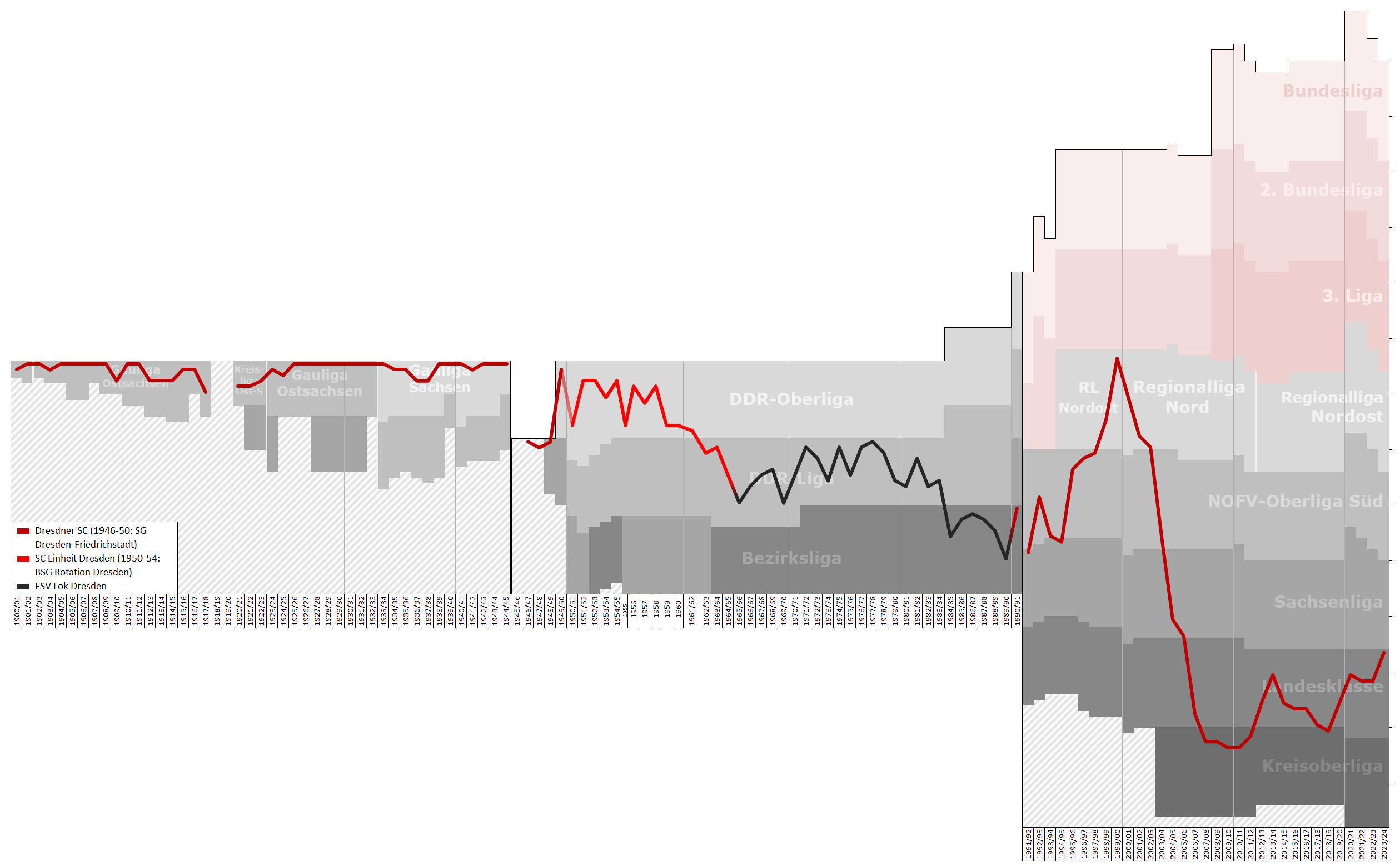|
FDGB-Pokal
The FDGB-Pokal (Freier Deutscher Gewerkschaftsbund Pokal or Free German Trade Union Federation Cup) was an elimination football tournament held annually in East Germany. It was the second most important national title in East German football after the DDR-Oberliga championship. The founder of the competition was East Germany's major trade union. History The inaugural FDGB-Pokal (generally referred to in English as the East German Cup) was contested in 1949, four years before the initial DFB-Pokal was played in the western half of the country. The first national cup competition had been the Tschammerpokal introduced in 1935. Each football club which participated in the East German football league system was entitled to enter the tournament. Clubs from the lower leagues played in regional qualification rounds, with the winners joining the teams of the DDR-Oberliga and DDR-Liga in the main round of the tournament of the following year. Each elimination was determined by a sing ... [...More Info...] [...Related Items...] OR: [Wikipedia] [Google] [Baidu] |
BFC Dynamo
Berliner Fussball Club Dynamo e. V., commonly abbreviated to BFC Dynamo () or BFC (), alternatively sometimes called Dynamo Berlin, is a German football club based in the locality of Alt-Hohenschönhausen of the borough of Lichtenberg of Berlin. BFC Dynamo was founded in 1966 from the football department of SC Dynamo Berlin and became one of the most successful clubs in East German football. The club is the record champion of East Germany with ten consecutive league championships from 1979 through 1988. BFC Dynamo competes in the fourth tier Regionalliga Nordost. The club enjoys a cross-city rivalry with 1. FC Union Berlin and a historical rivalry with SG Dynamo Dresden. The rivalry with Union Berlin is part of the Berlin derby. History Colours and crest The traditional colours of BFC Dynamo are claret and white. The colours were inherited from SC Dynamo Berlin and followed the claret colour scheme of SV Dynamo. BFC Dynamo has been playing in claret and white since its found ... [...More Info...] [...Related Items...] OR: [Wikipedia] [Google] [Baidu] |
Dynamo Dresden
Sportgemeinschaft Dynamo Dresden e.V., commonly known as SG Dynamo Dresden or Dynamo Dresden, are a German association football club based in Dresden, Saxony.Grüne, Hardy (2001). Enzyklopädie des deutschen Ligafußballs 7. Vereinslexikon. Kassel: Agon-Sportverlag. . They were founded on 12 April 1953 as a club affiliated with the East German police and became one of the most popular and successful clubs in East German football, winning eight league titles. After the reunification of Germany, Dynamo played four seasons in the top division Bundesliga from 1991 to 1995, but have since drifted between the second and fourth tiers. The club were relegated from the 2. Bundesliga to the 3. Liga at the end of the 2019–20 season, but earned immediate promotion back to the 2. Bundesliga by winning the 2020–21 3. Liga. Although the club's badge is predominantly red, they use gold and black as their home colours, derived from the official city flag and coat of arms of the city of Dre ... [...More Info...] [...Related Items...] OR: [Wikipedia] [Google] [Baidu] |
1959 FDGB-Pokal
The 1959 FDGB-Pokal was the eleventh edition of the FDGB-Pokal. The competition started with a qualifying round comprising the 30 finalists of the 15 regional district cups (german: Bezirkspokal), 54 teams from the third tier II. DDR-Liga and 14 teams from the second tier DDR-Oberliga. The winners of the qualifying round then met the 14 teams from the first tier DDR-Oberliga in the First round. Six teams from the DDR-Oberliga had already been eliminated by the Round of 16. This included the two finalists of the 1958 FDGB-Pokal SC Einheit Dresden and SC Lokomotive Leipzig. ASK Vorwärts Rostock and ASK Vorwärts Leipzig were the only remaining teams from the Bezirksligas in the Round of 16. The II. DDR-Liga was represented by four teams in the round. SC Chemie Halle and BSG Rotation Babelsberg were the only remaining teams from the DDR-Liga in the Round of 16. SC Traktor Schwerin from the II. DDR-Liga was the only team from lower leagues that made it to the Quarter-finals. The ... [...More Info...] [...Related Items...] OR: [Wikipedia] [Google] [Baidu] |
1956 FDGB-Pokal
The 1956 FDGB-Pokal started with 148 teams. It was the sixth time that the East German national cup in association football was contested. Due to the switch to a calendar year season the final took place at the end of the year. Two qualifying rounds were played before the first round. All rounds were played as knock-out matches with extra time following a draw after 90 minutes. If extra time yielded no winner, the teams faced each other again in a replay. 120 quarter-finalist of the DDR-Bezirkspokal competitions were joined by 21 members of the third-tier 2nd DDR-Liga that had been created in 1955. After the second qualifying round, the remaining 36 teams were joined by the 28 teams from the top-tier DDR-Oberliga and the second-tier DDR-Liga. By the third round proper none of the Bezirkspokal or 2nd DDR-Liga sides remained. In addition Oberliga sides Rotation Babelsberg, Motor Karl-Marx-Stadt, SC Rotation Leipzig and Motor Zwickau had been eliminated. Three DDR-Liga teams en ... [...More Info...] [...Related Items...] OR: [Wikipedia] [Google] [Baidu] |
FSV Zwickau
FSV Zwickau is a German association football club located in Zwickau, Saxony. Today's club claims as part of its complex heritage sides that were East Germany's first champions: 1948 Ostzone winners SG Planitz and 1950 DDR-Oberliga champions ZSG Horch Zwickau. History In addition to the earliest East German championship sides, current day club FSV Zwickau can name a long list of other local associations among its predecessors. Planitzer Sportclub Fußball-Club Planitz was established 27 April 1912 in a village of that name located south of Zwickau. On 28 August that year the team adopted the name Planitzer Sportclub and in 1918 was briefly known as Sportvereinigung Planitz, before again becoming SC on 2 February 1919. The club's first notable appearance was in the playoffs of the regional Mitteldeutschland (Central German) league in 1931 that saw them advance as far as the semi-finals. Under the Nazis, German football was reorganized in 1933 into sixteen top-flight divisions kn ... [...More Info...] [...Related Items...] OR: [Wikipedia] [Google] [Baidu] |
1952–54 FDGB-Pokal
The 1952–54 FDGB-Pokal was the third competition for the national cup title in association football in East Germany. The competition had started with 84 teams from the third-tier Bezirksliga and fourth-tier Bezirksklasse competitions of the 15 Bezirke. After two qualifying rounds the First Round was played with 64 teams on 7 June 1953. These 64 teams were the 21 remaining teams from the qualifying rounds, 26 teams from the second-tier DDR-Liga and 17 teams from the 1952–53 DDR-Oberliga. The matches for the second round were drawn, but not played due to the events around the uprising of 1953 in East Germany, even though officially the summer holidays were given as the reason for an indefinite postponement. In the spring of 1954, the Second Round teams were drawn again, and the competition resumed with the matches on 25 April 1954. By the Third Round, 13 of the Oberliga teams had been eliminated, but two Bezirksliga sides were still in the competition: BSG Chemie Apolda and Akt ... [...More Info...] [...Related Items...] OR: [Wikipedia] [Google] [Baidu] |
FC Rot-Weiß Erfurt
FC Rot-Weiß Erfurt is a German association football club based in Erfurt, Thuringia. History Foundation to World War II The club has roots that go back to a cricket club founded in 1895. As they broadened their interests they came to be called ''Sport Club Erfurt''. The club was a founding member of the German Football Association in 1900 and in 1904 they joined the ''Verband Mitteldeutscher Ballspielvereine'' (Central German Football League). The side won the league championship in 1908–09 and advanced as far as the semi final of the national round where they lost to the eventual champion. While Erfurt did manage to play for a number of seasons in the premier level Gauliga Mitte, formed after 1933, they failed to earn any honours. Post-World War II era In the aftermath of World War II, the Allies banned all organizations, including sport and football clubs. In 1946, the Soviet occupation authorities permitted the organization of five district sports clubs in Erfurt. ''SG ... [...More Info...] [...Related Items...] OR: [Wikipedia] [Google] [Baidu] |
SC Einheit Dresden
Dresdner Sportclub 1898 e.V., known simply as Dresdner SC, is a German multisport List of football clubs in Germany, club playing in Dresden, Saxony. Founded on 30 April 1898, the club was a Founding Clubs of the DFB, founding member of the German Football Association (Deutscher Fussball Bund) in 1900. The origins of the club go back still further to the predecessor side ''Dresden English Football Club'' formed in 1874 by expatriate Englishmen as Germany's first football club and possibly the earliest in continental Europe: ''Dresdener SC'' was organized by one-time German members of the ''EFC''. History On 30 April 1898, former members of the Dresden English Football Club and of the Neue Dresdner FC (founded in 1893 by former DEFC members and now SpVgg Dresden-Löbtau 1893) founded the Dresdner Sport-Club. Until sports historian Andreas Wittner uncovered the earlier history of the DFC, it was thought to have been founded only in 1890. Early on, ''DSC'' made regular appearances i ... [...More Info...] [...Related Items...] OR: [Wikipedia] [Google] [Baidu] |
Stadion Der Weltjugend
Stadion der Weltjugend was a multi-use stadium in the locality of Mitte in the eponymous borough of Mitte in Berlin, Germany. It was inaguruated on 20 May 1950 by the First Secretary of the Socialist Unity Party, Walter Ulbricht for the first "Deutschlandtreffen ("German Festival") of the Free German Youth. The stadium was initially named after Walter Ulbricht. The Walter-Ulbricht-Stadion had a capacity of 70,000 spectators and was complemented by several further football pitches, tennis courts and athletic fields. It was the largest stadium in East Germany at its opening. The stadium was a site of the 3rd World Festival of Youth and Students in 1951. The stadium was rebuilt for the 10th World Festival of Youth and Students in 1973. The renovations included the installation of seating, which reduced the capacity to 50,000. The rebuilt stadium was then also renamed to Stadion der Weltjugend ("Stadium of the World Youth"). The Walter Ulbricht-Stadion was the home ground of the foot ... [...More Info...] [...Related Items...] OR: [Wikipedia] [Google] [Baidu] |
Tschammerpokal
The DFB-Pokal ( is a German knockout football cup competition held annually by the German Football Association (DFB). Sixty-four teams participate in the competition, including all clubs from the Bundesliga and the 2. Bundesliga. It is considered the second-most important club title in German football after the Bundesliga championship. Taking place from August until May, the winner qualifies for the DFL-Supercup and the UEFA Europa League unless the winner already qualifies for the UEFA Champions League in the Bundesliga. The competition was founded in 1935, then called the '' Tschammer-Pokal''. The first titleholders were 1. FC Nürnberg. In 1937, Schalke 04 were the first team to win the double. The Tschammer-Pokal was suspended in 1944 due to World War II and disbanded following the demise of Nazi Germany. In 1952–53, the cup was reinstated in West Germany as the ''DFB-Pokal'', named after the DFB, and was won by Rot-Weiss Essen. (FDGB-Pokal, the East German equivalent, st ... [...More Info...] [...Related Items...] OR: [Wikipedia] [Google] [Baidu] |
FC Erzgebirge Aue
Fußball Club Erzgebirge Aue e.V., commonly known as simply FC Erzgebirge Aue or Erzgebirge Aue (), is a Football in Germany, German football club based in Aue-Bad Schlema, Saxony. The former East German side was a founding member of the 3. Liga in 2008–09, after being relegated from the 2. Bundesliga in 2007–08. The city of Aue-Bad Schlema has a population of about 20,800, making it one of the smallest cities to ever host a club playing at the second highest level of German football. However, the team attracts supporters from a larger urban area that includes Chemnitz and Zwickau, whose own football sides (Chemnitzer FC, CFC and FSV Zwickau, FSV) are among Aue's traditional rivals. History 1945–1963: East Germany's dominant side The club was founded as ''SG Aue'' in 1945, and on 1 November 1948 became ''BSG Pneumatik Aue'' under the sponsorship of the local construction tool works. Changes in sponsorship led to a change in name to ''BSG Zentra Wismut Aue '' in 1949 an ... [...More Info...] [...Related Items...] OR: [Wikipedia] [Google] [Baidu] |
DFB-Pokal
The DFB-Pokal ( is a German knockout football cup competition held annually by the German Football Association (DFB). Sixty-four teams participate in the competition, including all clubs from the Bundesliga and the 2. Bundesliga. It is considered the second-most important club title in German football after the Bundesliga championship. Taking place from August until May, the winner qualifies for the DFL-Supercup and the UEFA Europa League unless the winner already qualifies for the UEFA Champions League in the Bundesliga. The competition was founded in 1935, then called the '' Tschammer-Pokal''. The first titleholders were 1. FC Nürnberg. In 1937, Schalke 04 were the first team to win the double. The Tschammer-Pokal was suspended in 1944 due to World War II and disbanded following the demise of Nazi Germany. In 1952–53, the cup was reinstated in West Germany as the ''DFB-Pokal'', named after the DFB, and was won by Rot-Weiss Essen. (FDGB-Pokal, the East German equivalent, s ... [...More Info...] [...Related Items...] OR: [Wikipedia] [Google] [Baidu] |






